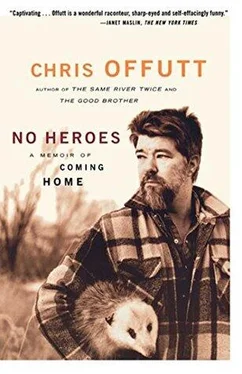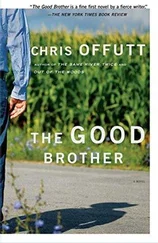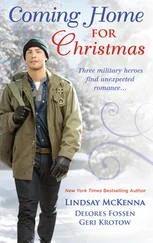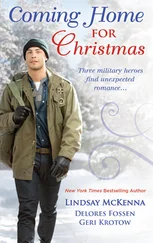I hid it the whole time in the one place a woman has to hide something in.
Waugh, that’s why I lost mine. I don’t have that place.
Elie I didn’t see again. I didn’t hear from him, nothing, absolutely nothing. I think he went to Israel, to fight for independence.
I sent Eugene a letter encouraging him to continue his writing. I also helped Sandra transfer to a better school, or, as she said, “a real school.” She appreciated my phone calls and letters on her behalf, telling me it was the most effort any teacher had exerted for her. I was proud until I realized just how minor it was in light of my ambition a few months prior. I told myself that I had tried, but I often wondered if this was true. I’d gotten deeply discouraged and turned tail at the first opportunity. My dreams of home lay in shards.
I made a final trip to town for packing supplies. Snubbing the mall, I drove several miles out of my way to pay higher prices in Morehead, then strolled along the campus. The buildings were the same but several trees were gone, including the tall fir that was decorated every winter with lights. A construction site had replaced the trees with a concrete wall, ramp, and steps leading to a stone gazebo. A maintenance worker I didn’t recognize was planting shrubs at the base of the five-foot wall.
“Hey,” I said. “What is this thing?”
“Aw, just some bunch of brick we got to take care of.”
“What’s it supposed to be?”
“Well,” he said, “they’re a-calling it a bell tower.”
“Kind of low for a tower.”
“I’d say so,” he said, “but I ain’t never seen a real one. Maybe some come low.”
“Where’s the bell?”
“They ain’t no bell. They got speakers. Supposed to be loud ones.”
“Well,” I said.
“This whole thing run a million dollars. Some rich lady from Lexington gave the money.”
“For a bell that don’t work.”
“Yup.” The man grinned. “And a short tower.”
“Didn’t anybody say something about chopping all the trees down?”
“They put us to doing it when the students were gone. They was some to get upset, but it didn’t do no good. You can’t put back a tree.”
“You sure as hell can’t.”
“I’ll thank you not to talk that way.”
“What?”
“Bad language and such.”
“Sorry,” I said. “See you.”
He nodded and I continued my walk, his request a reminder of where I was — not merely in the Bible Belt, but smack dab in the middle of its giant buckle. I was going to miss the woods, but not the constant self-oppression.
There is a children’s model that you assemble with glue called The Visible Man, a transparent shell containing the organs of a human. As I walked the crooked Main Street, I felt as if my body was exposed, my nervous system raw to the wind, my heart on view. Only my mind remained hidden. I was The Visible Ghost, recognized by people I knew twenty years ago, ignored by everyone else.
My favorite spot in town was on the courthouse lawn, sitting behind a monument that honored fallen soldiers. A statue of a doughboy strode through a jumble of barbed wire. He was perpetually heading east toward the hills that hemmed the town. Fastened to the base of the statue was a list of fallen soldiers, their last names as familiar as the sound of rain. It was hometowns that enraptured me with awe — Hilda, Craney, Yale, Smile — names I had never heard. Where in Rowan County was the community of Smile? Eventually people wouldn’t know where Haldeman was. They will study a map or a plaque or a book and find a reference to a town that no longer exists. My hometown will be a land of ghosts.
See what the town is, I told myself, not what it was. I opened my notebook and dutifully recorded what appeared before me. The paint on Progress Hall was peeling. Bauson’s was a pizza joint, the courthouse was a tourist attraction, and the old jail was used for city storage. Behind it, a manhole cover had been seeping raw sewage into the street for two months. Cars drove through it and people walked in it. Directly above it hung a sign welcoming parents to Morehead State University.
Suddenly a voice yelled at me.
“You writing a book?”
I recognized a boy from childhood who had inexplicably become a grown man driving a huge truck.
“You bet,” I said.
“I thought that’s what you was up to.”
“You want to be in it?”
“Hell, yes,” he said. “I’ll give you a beer.”
“All right. You’re in.”
“Write me a whole chapter and you can have a shot at my old lady. But it ain’t as good as everybody says.”
I laughed and the light changed.
“See you, buddy,” he shouted, and drove away.
I left the statue and walked half a block to visit the library. Frankie was gone and I wrote her a note. As I was leaving, my seventh-grade teacher pushed open the heavy doors. Mr. Ellington seemed extremely tall when I was a kid; now he appeared to have shrunk. As the only male teacher at Haldeman School, he enjoyed special status as auxiliary bus driver, stern disciplinarian, and favored teacher of the boys. He brought enough pocket knives for each boy to have one, then showed us how to carve soap. Sometimes students gave Mr. Ellington broken guns that he repaired at home.
One day each year he came to school wearing a buckskin shirt and leggings he made from a deer he’d shot. From his belt hung a powderhorn, a bullet pouch, and a leather bag containing flint and wadding. He also carried a Bowie knife and a tomahawk, which he could throw with remarkable accuracy. He fired his long rifle out the classroom window so we could see the twin puffs of smoke — one from the powder igniting in the pan, and the second billowing from the muzzle.
“Mr. Ellington,” I said. “Is that you?”
He nodded, staring hard at my face, trying to place me amid forty years of children exchanging places in his classroom.
“I’m Chris Offutt,” I said. “From Haldeman.”
“Chris,” he said. “How are you getting along? I heard you were in.”
“That’s right.”
“I’m here every day. I mainly read Louis L’Amour.”
“I’ve read him.”
“Would you like to see my pride and joy?”
I nodded and he opened his wallet. I expected to see a sports car because he had the reputation of a leadfoot. Instead he pulled out a color photograph of a bottle of the dishwasher fluid Pride, beside a bottle of the detergent Joy. He chuckled, holding the thin bridge of his nose between a long bony forefinger and thumb, a familiar gesture.
“Take that with you,” he said, handing me the photograph. “I’m the champion horseshoe thrower in the state in my age group. Over seventy. Say hello to your brother and sisters.”
“Your Kentucky history class had a big effect on me. You were a good teacher.”
“I read your books,” he said. “You wrote it the way it is, not the way some people wish it was.”
He walked past me, surprising me with the suddenness of his departure and the agility in his step. I had often imagined that if calamity befell my parents Mr. Ellington would adopt me. He’d raise me as the son he never had and teach me how to make moccasins, load the long rifle at a run while dragging the gun butt behind me in the brush, throw a tomahawk, sharpen a knife, cut a fishing pole and make a hook, survive in the woods on game and wild vegetables, start a fire with flint, and live in a rock-house.
I went outside and blinked. Mr. Ellington loved Kentucky heritage, and conveyed a certain pride to all his students. More than anyone, he showed us who we were in the hills. History itself is accomplishment, and he had displayed ours. Mr. Ellington gave us identity by giving us himself.
Читать дальше












